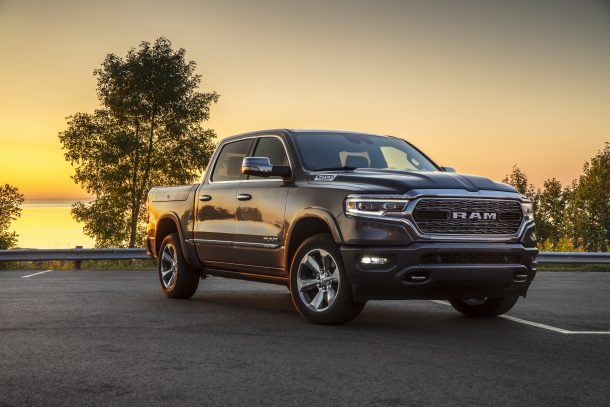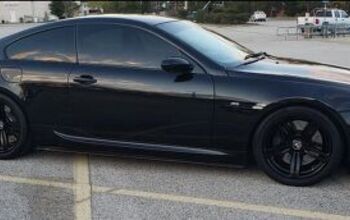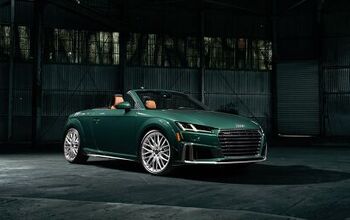Coronavirus Impact: Canadian Auto Sales Drive Off a Cliff

Mirroring its southern neighbor, Canadian auto sales took a dive last month as measures designed to slow the spread of COVID-19 went into effect across the country. First-quarter volume, as a result, fell roughly 20 percent across the industry, with March’s decline pegged at 48 percent by DesRosiers Automotive Consultants (via Bloomberg).
Still, amid all the gloom were statistical bright spots.
First off, due to incredibly low volume and the timing of orders, sales of the loftiest automotive products in the land actually rose in Q1 2020. Marques like McLaren, Lamborghini, Bentley, and Rolls-Royce posted quarterly gains. It’s likely only a vanishingly small amount of their combined volume hit sales sheets in the last half of March, resulting in the skewed results.
January and February were seen as fairly healthy sales months on both sides of the border.
According to figures from the Automotive News Data Center, the Detroit Three fared better in the U.S. than in Canada last quarter. While the Fiat Chrysler, Ford, and General Motors posted Q1 declines of 10.9 percent, 12.5 percent, and 7.1 percent, respectively, in the U.S., the Canadian tally revealed drops of 18.9, 13.8, and 12.8 percent, respectively.
Product timing and heightened demand for pickup trucks versus all other segments meant some mainstream product fared better north of the border. Ram volume was nearly flat (a 0.7-percent loss), thanks to a 50-percent increase in Heavy Duty volume over the quarter. Sales of the soon-to-die Dodge Grand Caravan rose 2 percent. Brand-wise, Jeep and Chrysler fared the worst, with drops of 35 and 55 percent, respectively.
At Ford, Explorer, Expedition, and Super Duty sales all rose significantly over Q1 2019, the result of new product and higher volumes in the first two months of the year. The Ranger was also the beneficiary of this phenomenon. Bright spots span the pricing ladder at GM, with such models as the Chevrolet Trax and Corvette, Silverado and GMC Sierra all posting quarterly gains. The Chevy Bolt and new-for-2019 Blazer appear on that list, too, as does the Buick Envision.
Leading the volume-loss pack among import brands was Infiniti, whose sales fell more than 50 percent in Q1 2020. If you’ve paid attention to the brand’s trajectory in the U.S., you’ll know that coronavirus can’t take the blame for the entirety of that loss. Other Japanese brands, including Honda, Nissan, and Acura, recorded a volume loss of greater than 30 percent.
Looking to Europe, BMW Group brands sank a combined 30 percent last quarter, while Volvo came close with a 29-percent drop.
[Image: Fiat Chrysler]

More by Steph Willems
Latest Car Reviews
Read moreLatest Product Reviews
Read moreRecent Comments
- Jeff One less option will be available for an affordable midsize sedan. Not much can be done about GM discontinuing the Malibu. GM, Ford, and Stellantis have been discontinuing cars for the most part to focus on pickups, crossovers, and suvs. Many buyers that don't want trucks or truck like vehicles have moved onto Japanese and South Korean brands. Meanwhile large pickups and suvs continue to pile up on dealer lots with some dealers still adding market adjustments to the stickers. Even Toyota dealers have growing inventories of Tundras and Tacomas.
- Lorenzo This car would have sold better if there was a kit to put fiberglass toast slices on the roof.
- Lorenzo The Malibu is close to what the 1955 Bel Air was, but 6 inches shorter in height, and 3 inches shorter in wheelbase, the former making it much more difficult to get into or out of. Grandma has to sit in front (groan) and she'll still have trouble getting in and out.The '55s had long options lists, but didn't include a 91 cubic inch four with a turbo, or a continuously variable transmission. Metal and decent fabric were replaced by cheap plastic too. The 1955 price was $1765 base, or $20,600 adjusted for inflation, but could be optioned up to $3,000 +/-, or $36,000, so in the same ballpark.The fuel economy, handling, and reliability are improved, but that's about it. Other than the fact that it means one fewer sedan available, there's no reason to be sorry it's being discontinued. Put the 1955 body on it and it'll sell like hotcakes, though.
- Calrson Fan We are already seeing multiple manufacturers steering away from EVs to Hybrids & PHEVs. Suspect the market will follow. Battery tech isn't anywhere close to where it needs to be for EV's to replace ICE's. Neither is the electrical grid or charging infrastructure. PHEV's still have the drawback that if you can't charge at home your not a potential customer. I've heard stories of people with Volts that never charge them but that's a unique kind of stupidity. If you can't or don't want to charge your PHEV then just get a hybrid.
- AZFelix The last time I missed the Malibu was when one swerved into my lane and I had to brake hard to avoid a collision. 1 out of 5⭐️. Do not recommend.



































Comments
Join the conversation
Canada was the second-largest producer of automobiles in the world from 1918 to 1923. I say it's time for a comeback. Step one: Think outside Ontario. https://www.ic.gc.ca/eic/site/auto-auto.nsf/eng/am00767.html Yukons could be assembled in Yukon, for example. (Why must I think of everything?)
"Marques like McLaren, Lamborghini, Bentley, and Rolls-Royce posted quarterly gains." The rich will always be rich. And often they get richer during times of economic crisis as they pit unemployed workers against each other to lower wages, and buy up real estate and stocks at deflated prices.